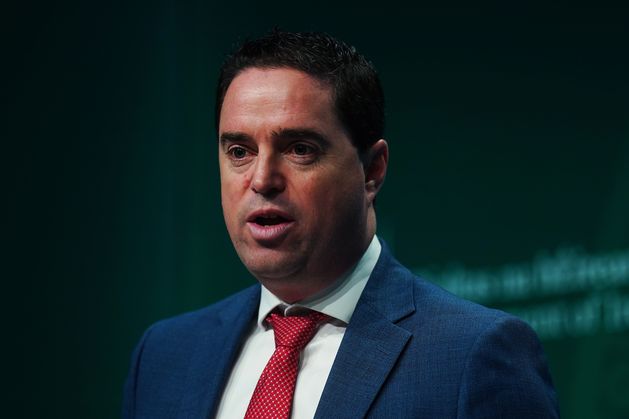Earlier this week, Mr Heydon announced a mandatory housing order for all poultry and captive birds, which is set to come into effect next Monday, November 10.
All flocks will have to be housed or kept indoors under the order, to prevent them from mixing with wild birds potentially carrying the infection.
The move comes following two confirmed outbreaks of highly pathogenic avian influenza (or bird flu) on commercial turkey farms, one in Co Carlow and another in Co Meath. The virus has also been found in dead birds in Fota Wildlife Park, forcing its closure until the end of the month.
Speaking to reporters on Friday, Mr Heydon said: “It’s allowed for in the legislation that when it’s a mandatory housing order, that for a short period, that free-range status is maintained.”
The Agriculture Minister was speaking alongside Jessika Roswall, the European Commissioner for the Environment, who was visiting Ireland
The legislation around mandatory housing orders allows for producers to retain their free-range labels for a period of time, despite their birds being kept indoors.
In the case of birds bred for meat, the free-range label can remain for 12 weeks. For eggs, the free-range label can remain for up to 16 weeks after the housing order is introduced.
While it remains unclear how big of an impact the outbreaks of bird flu will have on supply and prices, Mr Heydon said there are no concerns over consumers being put off from buying turkeys, leading to a fall in demand as we get closer to Christmas.
“We’ve assured everybody that properly cooked poultry meat and egg products are perfectly safe to eat,” he said.
“There is the public health advice that if the public see a sick or dead bird, not to handle it, but instead to contact my Department though our regional veterinary offices or our emergency online numbers.
“Everyone can rest assured that across the sector, the industry is working with Government, working with my Department and our vets.
“We are working together to mitigate the risks of the spread of avian influenza among our commercial flocks and captive birds.”
The last week of November and the first week of December are seen as the busiest period for turkey farmers, with most of the turkeys for Christmas processed over those two weeks.
Following confirmation of the Co Carlow outbreak of the virus, also known as H5N1, a number of measures were put in place to limit the spread.
This includes restriction zones put in place around the farms where there have been outbreaks – a 3km protection zone and a 10km surveillance zone.
A housing order similar to that announced by Mr Heydon has also been put in place in Northern Ireland. that order came into effect on Thursday, meaning all of the poultry on the island should be housed come next Monday.
In addition to the outbreaks in Carlow and Meath, suspected cases of the virus have been detective at commercial poultry premises in Co Tyrone and Co Fermanagh.

